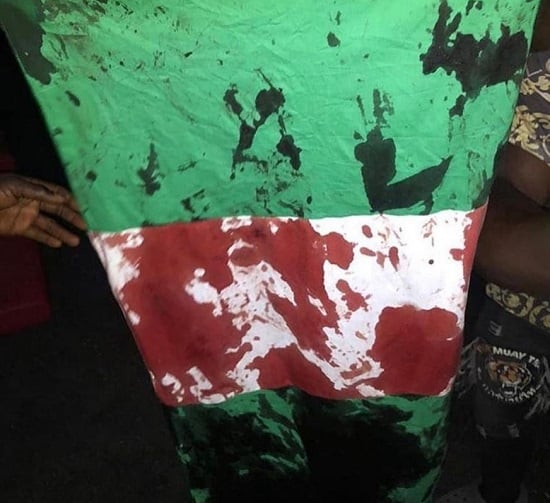In the last two weeks, Nigerian youths have filtered into the streets of at least 26 state capitals of the federation in condemnation of the history of police brutality in Nigeria. And there is nothing to suggest they are stopping soon.
In Rivers State, the youths, last Monday defied a ban on protests by the state government and took over major roads in the state capital until the governor himself, who had placed the ban, had to come and address them. Also in the Federal Capital Territory, similar scene played out. A ban against protests announced by the Abuja Federal Authorities on October 15, was roundly disobeyed. As a matter of fact, the youths took things to a different dimension as they blocked the popular Airport road, leading to the cancellation of so many pre-scheduled flights due to traffic gridlock.
In a sense, those two incidents sum up the anger and frustration of the Nigerian youths against the epidemic of police brutality that they had been subjected to for too long.
Interestingly, the menace of police brutality has received ad nauseam the intervention and condemnation of the Nigerian courts in a long league of cases.
Advertisement
Whether in aiding and abetting crime against their constitutional mandates; or the elevation of abuse of the fundamental right of dignity of citizens to state craft by their modus operandi; or in their being used to settle otherwise civil disputes by unscrupulous members of the society, and more, our adversarial jurisprudence is rich with chilling cases of the professional malfeasance of personnel of the police force and the condemnation of the intermediate appellate court and the apex court in tow.
In this season of global attention to the notoriety of the Nigerian police, it is sufficient to highlight some of the diverse intervention of the judiciary against the police menace, with a view to providing some more context for what we are witnessing today in the form of mass protests across the country.
A TRIP THROUGH THE CASES
Advertisement
In Njovens & Ors v State (1973) LPELR-2042(SC), the facts of which are mindboggling, the four appellants were the defendants at the trial court arraigned before Adesiyun J. in the High Court of Borin, Kwara State on a nine count charge bordering on conspiracy to abet and abetting the commission of crime. The long and short of the case is that one Felix Dumeh and other criminals robbed the then Barclays Bank Nig Ltd. Illorin branch a total of thirty-five thousand pounds on the 13th day of April, 1971 and promised the sum of five thousand pounds to the Appellants who were police officers in consideration of concealing the robbery, and which they received. After a protracted trial that eventually got to the Supreme Court, the Court acquitted them on counts 3-9, but affirmed their conviction and sentence on counts one and two, for aiding and abetting the robbery of the bank.
If the circumstances of the Njovens case are not chilling enough, the conduct of the police officers in Oyakhire v The State (2006) 15 NWLR (Pt.1000) 157 are particularly disturbing. The Appellant, and his co-accused, a constable, did not only rob and murder their victims. They also set the bus in which they were travelling ablaze. In venting its spleen and condemning the conduct of the Appellant after affirming his conviction and sentence, the apex Court roared:
“This case represents the height of man’s inhumanity to man. The Appellant and his co-accused police office constables employed by the nation to protect the lies and properties of its citizenry embarked on this unlawful mission and in their brazen brutality terminated the lives of these five innocent and defenseless victims, with unimaginable damages to their loved ones and families back at their various homes. The case demonstrated the regrettable reality that numerous police check points along our highways only give citizenry a false sense of security”.
In Nwankwola v FRN (2015) LPELR-2439(CA), the police was also at their worst behavior. There, the Appellant, a police officer was arraigned before a High Court in Benin, where he was convicted and sentenced to seven years imprisonment with hard labour for demanding the sum of one million naira from one Alexander Okiye, a person against whom criminal complaints were made, and eventually receiving the sum of five hundred thousand naira (500,000) from him. It was a case that threw light on the rackets that are being run by police officers across police formations in the country to line their pockets while intimidating suspects under investigation.
Advertisement
Elsewhere, the proximate facts of Ibikunle v The State (2007) LPELR-8068 (SC) are not completely out of the known pattern of police notoriety. There, the Appellant who had gone to effect the arrest of a suspect, ended up killing the suspect, only to discover afterwards that he had killed the wrong man. His defense, as usual, was that he did not shoot to kill. It bears stating that he had forced himself into the apartment of the victim who had refused to open the door, for whatever reason, but met his untimely death at the hands of the trigger happy police sergeant who clearly was baying for blood. Their lordships of the apex Court would have no qualms in affirming his conviction and death by hanging by the lower Courts.
In Agbo v State (2004) LPELR-7388 (CA), we find the same trend. Here, the appellant was a young police constable of about 24 years. Following a short argument with the deceased, he pulled out a berretta pistol loaded with seven rounds of ammunition he was carrying and pumped it into his victim, who died at the spot. What was the sin of the deceased? He had stopped almost in the middle of the road to unload some passengers he was carrying in a Peugeot 504. The prosecution having made a clean sweep of its case, the intermediate appellate Court endorsed his conviction and sentencing by the lower Court while dismissing his rehearsed defence of accidental discharge. A familiar refrain.
In Okonkwo v Ezeonu & Ors (2017) LPELR-42785 (CA) the Court of Appeal condemned the attitude of the police vis-à-vis the fundamental right to dignity of persons in their custody, describing it as barbaric and unconstitutional. In that case, the Appellant who had been unlawfully arrested by the 3rd and 4th Respondents (police officers) was detained for eleven days without trial at the instigation of the 1st and 2nd Respondents. He was tortured and brutalized following which he filed a fundamental right action for the breach of his fundamental right. Having failed at the lower Court, his appeal was allowed by the appellate Court which mulcted the Respondents in costs and damages for their egregious conduct.
In recent years, the use of police officers as debt recovery agents and their undue meddling in otherwise civil relations between individuals and/or corporate organizations, have also earned the rebuke of the courts. In the very recent case of Kure v COP (2020) LPELR-49378 (SC), the apex Court decried the disturbing practice thus:
Advertisement
“As I went through the facts of this case, I was wondering how a purely civil matter could easily metamorphose and transubstantiate into a purely criminal case. The end result now is that Appellant has suffered irreparable damage, disgrace, shame, odiousness and untold hardship in the hand of the police that is constitutionally and legally saddled with the prosecution of criminal offences. The police have muzzled the rights and freedom of Nigerians even where cases are clearly outside their jurisdiction, power or corridor….if this is not tackled, everybody would have suffered in the merciless hand of the police who has become a law unto itself in this country”.
Yet again, in a Notable Pronouncement of Bage J.S.C in Diamond Bank Plc v. Opara (2018) 7 NWLR (Pt.1717) 92, the apex Court decried the obnoxious practice of using police men to enforce contractual claims in strident tone relevant for the times:
Advertisement
“What is even more disturbing in recent times is the way and manner the Police and some other statutory agencies, rather than focus squarely on their statutory functions of investigation, preventing and prosecuting crimes, allow themselves to be used by overzealous and/or unscrupulous characters for the recovery of debts arising from simple contracts, loans or purely civil transaction.
“Our security agencies, particularly the police, must know that the citizenry’s confidence in them ought to first be ensured by the agencies themselves by jealously guarding the integrity of the uniform and powers conferred on them. The beauty of salt is its taste. Once salt loses its own taste, its value is irredeemably lost. I say this now and again, our security agencies, particularly the police are not debt recovery agencies. The agencies themselves need to first come to this realization, shunning all entreaties in this regard and they will see confidence gradually restored in them.
Advertisement
“Where we are now in this country is that place where our “Men in black & blue” command almost no respect from the citizenry because of how we have sunk. But it is my belief, which belief, I must say I hold very dearly, that all hope is not lost, many women and men of deep integrity are in our security agencies, and they only need to rise now to the occasion.”
In that case, the Appellant, a defunct bank, had instigated operatives of the Nigerian police to arrest the 1st and 2nd Respondents, who were indebted to it, to extract redemption of the loan. In carrying out the hatchet job, the police detained the 1st Respondent, the alter–ego of the 2nd Respondent and did not grant him bail until he was forced to make a payment of one million to the appellant-bank, and to also issue a cheque of one million in favour of the said appellant.
Advertisement
In many ways, the above dictum of Bage JSC pretty sums up the notoriety of the police, particularly in the context of the ongoing protests, as the protesters have continued to chronicle cases of police officers encroaching into the personal affairs of private citizens, and in the process harassing and abbreviating their rights as citizens.
Yet, all the above decisions are only but a footnote in the compendium of cases of judicial intervention in Nigeria for which space constraints would not allow us to explore. Suffice to state however, that the judiciary has had its own fair share of the protests against police brutality through the leaves of our law reports.
CONCLUSION
This intervention will be incomplete without mentioning the infamous #ApoSix case. A case so emblematic of the police menace in Nigeria involving the murder of six young civilians in 2005 by a team of the police at a checkpoint on Gimbiya Street by Ahmadu Bello Way in the Apo district of FCT Abuja, while returning from a night out.
Despite the conviction and sentence to death of two, out of the police officers involved in the dastardly act three years ago by an Abuja High Court, (and acquittal of the other suspects including one Danjuma Ibrahim, a Deputy Commissioner of Police whom witnesses told the Court personally shot at the victims), the circumstances surrounding the case continues to highlight the impunity culture of the Nigerian police and stands out as the climax of the fractious relationship between the police and the citizens in recent history.
What we are seeing in the streets today, is therefore, the expression of years of accumulated grievances against the police by citizens, particularly the youth. And if it eventually opens a new slate of police-citizens relationship and holistic reform of the police in Nigeria, then it’d have been worthwhile.
Raymond Nkannebe, a Legal Practitioner, writes from Lagos. Follow him on Twitter @Raynkah
Views expressed by contributors are strictly personal and not of TheCable.
Add a comment







